Indie Beat: Matt Johnson And The Unbearable Lightness Of Movies -- THE DIRTIES Director On Media And Obsession
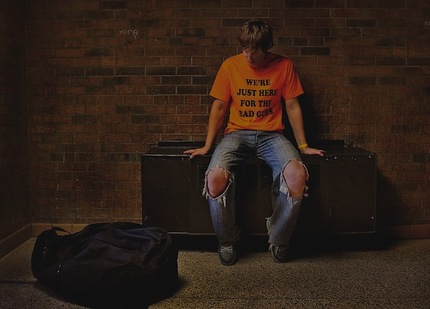
The Dirties is shot as a faux-documentary, chronicling Matt, and his friend Owen's (played by real life buddy Owen Williams) attempt at making a pastiche heavy revenge movie where they kill the gang of bullies at their school which they've dubbed 'The Dirties'. What begins as an outlet to vent their own frustrations and abuse soon takes a dark turn when Matt begins to plot a sequel to the movie where they would actually kill the bullies. The Dirties is both very serious and quite funny. So, dare I say it? The Dirties is seriously funny. It's a sentiment I think both Matt Johnsons would probably give a thumbs up to.
Premiering at Slamdance mere weeks after the Sandy Hook tragedy -- Johnson and co. were sure that the screenings would be cancelled -- The Dirties went on to win both the Grand Jury Narrative and Spirit Of Slamdance awards before blazing a trail across the festival circuit, from SXSW to Locarno and Fantastic Fest. It is now available on VOD platforms like iTunes in North America, and is continuing a small, if buoyant, theatrical run through the end of the month. I've said this in the Indie Beat column before (and not to mention in my review of the film), but The Dirties is one of the most compelling films of the year, and without a doubt the most intelligent and empathetic look at school violence I have ever seen.
On the eve of the film's release I was able to sit down with Matt Johnson over a hearty breakfast in the Los Anglese neighborhood of Los Feliz. Johnson is an affluent and energized speaker, the conversation between us ballooning to some great heights, which means, yes, it's a long read, but I am hoping it will be well worth it. We discuss, amongst other things, media literacy, (self) perception, (self) obsession, cynicism and optimism in geek culture, shooting without a traditional script, and how one talks like a man with Werner Herzog.
ScreenAnarchy: Every time I sit down with somebody, regardless how much we've talked off hand or not, I always like to start off with origins, where you started out as a storyteller. Did your youth actually reflect the teenagers in the movie as closely as it seems?
Matt Johnson: The film is a clear genesis of what my life was like as a kid in high school trying to make movies. That scene that happens with our media teacher, where I get told what I am not allowed to do, that was real. I constantly made stupid movies, sort of like indie 90s rip offs, with my best friends. That sort of lead me to film education and wanting to go to film school. Then all of a sudden I started taking things a lot more seriously.
Rather than just what you'd call goofing off.
Yeah, but ironically all the serious movies I made in film school were so terrible and pretentious... I was like "what am I doing? These are awful!"... so I started making goofy, ridiculous things again. And then I made that web show, Nirvana The Band The Show, which is basically the pinnacle of goofiness and nonsense.
Clearly, but in the best sense.
In the best way, yeah. And formally I think it's actually quite refined in how it's being put together. I like that. I actually think that's a very cool trick to do with audiences... to have characters that seem so stupid, for lack of a better word, and kind of ridiculous...
...Naive...
Naive, yes, exactly. But operating inside of a world that sort of has a cliched Hollywood narrative spine where you never feel like you're being left confused, or the story is meandering or anything like that.
Well, that leads me to think about really the nature of THE DIRTIES, and the ideas around media that are presented in the film, and of cinema especially. My sense is that it is okay to use cinema to understand the world, but getting into it the way someone like Matt does in the film, only existing from that vantage point... there's this tunnel vision to that, something dangerous and myopic.
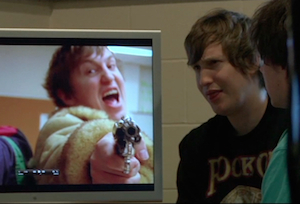 I think Matt is clearly trying to make himself into a movie star. He's so obsessed with the American treatment of film.
I think Matt is clearly trying to make himself into a movie star. He's so obsessed with the American treatment of film. That kind of sensationalism.
And the epicness of it and the mythology of it. He's so obsessed with mythology in a way that's he's constantly aping characters and lines. Half of the things that he says are in someway referential and reverential of this type of world.
My reading of it is that as obsessed and as knowledgeable as he is, he is not media literate.
Exactly!
He does not understand what he's obsessing over in a larger context and how to read that outside of his own space.
Yeah, to him it's like the currency of the modern world. Being a part of this, or being involved in it. He sees films with no sense of cynicism or irony. He just thinks of the best. Quentin Tarantino and Christopher Nolan movies are just like gospel to him. There's absolutely nothing wrong with them. He doesn't view them critically at all.
Was this how you were in high school?
A hundred percent. Because I didn't know anything. I thought "oh, if it's a movie then it's gotta be great!" And if I'm getting a visceral thrill out of watching it... you know it's like when you watch Fight Club when you're fifteen years old and you're like "well this is just the best! There's nothing wrong with this!" And then you get older and you go "oh, what a mess of a movie," because all of a sudden you're looking at it through this new lens of criticism.
Do you find that that comes into play within the context of the film, for you as a filmmaker now?
I'll tell you I watched it for the first time since Slamdance two nights ago, and the whole first twenty minutes I was like "oh this is so terrible! Man look at all this stuff we left in here." But for me I forget that the whole point of the beginning of the movie is to tell audiences that these kids are kids. They're making this movie and...
There's this buoyancy to it, there's this gleefulness to it.
And a lot of it is sort of a mess, in terms of how Matt is putting it together.
I watched it on Monday for the first time since Slamdance as well. So many more things were coming up for me, just sitting in my room, on my own, no other audience.
I think that's the best way you can view the film actually.
Well it was strange... just to give mention how I first saw it... and I guess the first time you saw it with an audience too... was that Friday screening at Slamdance.
Yeah.
Everyone was packed in there, spilling out of aisles, piling on the floor. I was leaning on pillows some friends had brought down from their room. To go from that, where one of my friends said, "I thought they were gonna come out and shoot all of us at the end..." that this was some sort of fucked up experiment...
[We both laugh]
...to sitting in my room and watching the film and gauging merely my own sole reaction was fascinating because it is such a film that can stir the audience up, that asks them for their immediate attention.
And their involvement.
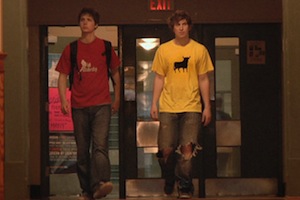 I think that's what the film does absolutely best. It calls for a certain level of empathy, certainly by the end of the movie. I don't think... and you'd have to tell me your experience since talking to folks... I would never get the impression that there are people that do not at least hold sympathy or some level of understanding for where Matt has gone and why this is happening. To me the point of the film is "let's not view this person as a monster." In terms of his choices and where he's gone by the end point.
I think that's what the film does absolutely best. It calls for a certain level of empathy, certainly by the end of the movie. I don't think... and you'd have to tell me your experience since talking to folks... I would never get the impression that there are people that do not at least hold sympathy or some level of understanding for where Matt has gone and why this is happening. To me the point of the film is "let's not view this person as a monster." In terms of his choices and where he's gone by the end point. The reaction from audiences has been unbelievably consistent no matter where we screen it. Whether it's at a festival like Sarasota, which is all people in their 70s and 80s, or Fantastic Fest, which is all young film fanatics. That sense of empathy that we're giving this character I think is equally disturbing and rewarding for all those audiences. More than anything else. More than the jokes or the references or the style. That seems to be the thing that is uniting audiences who see it on the festival circuit. They're really quite shocked.
As I watched it again, I was taking in even more all the little details in the world, and two things stood out to me that were really about how we talk about media as a people and how we collectively, individually look at ourselves in the media... So two things came up. Firstly, it was in Matt's basement where there are THE O.C. posters...
And we've switched the names to Matt and Owen.
There's that projection of: these are the kinds of guys we want to be.
Or even further... That that is me. There is that projection. I think that was very much at the forefront of me and my co-writer Evan Morgan's mind... as we were putting this together... is that Matt is the type of guy who doesn't just think a line like this guy, he watches movies and thinks -- and this is pretty much the way I am in real life -- I am this guy. That is me! That first season of The O.C.... that was made for me and I can own that and nobody can ever get in the way of that. It gives Matt a power, a real power where he can act sort of like a celebrity or where he has impunity.
On the other end of it was the way the pretty and popular girl Chrissy (Krista Madison) is presented in the film. She is essentially the only person in the film that looks like she is from a Hollywood teen film, but she doesn't really act that way at all. Her openness to creating a relationship with Owen and having that shift the dynamic between Matt and Owen's friendship is something that we rarely see on screen, so that's breaking down a certain kind of stereotype.
And I think it's also kind of bizarre.
[At this point our server comes over with an adjusted order and we begin a side dialog with Matt's friend about strawberry and Nutella crepes, which he has never had before]
I guess I'm just an ignorant boor, like everyone says.
Yeah, I highly doubt that.
Anyway, so we were talking about projection. I think your instinct is a hundred percent right in that what we see in the first half of the film is Matt saying "I'm gonna be like this guy, I'm gonna be like this guy, I'm gonna be like this guy." An important turning point for me when I watch the film is that after about the mid point, or a little after the mid point, Matt all of a sudden starts imitating himself from the movie. There's this weird shift where he stops being obsessed with movie characters and he becomes his own movie character.
Certainly once he starts editing the movie during the movie itself we start to see that process. Suddenly there's this loop that happens, this cycle... and it doesn't even really end because there's that line that Matt says to the guys behind the camera: "you're probably gonna have to add the end titles." There's that notion that things are continuing and forever looping back on itself, particularly when Matt begins to obsess over his own eccentricities and performances. I think the real turning moment comes when he's watching that time in the hallway...
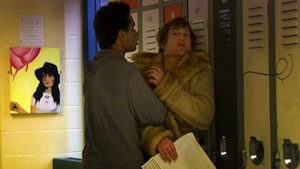 ...When he's getting beaten up. And that's actually one of my favorite scenes in the movie because it gets at that just so straight. Like he's watching himself saying "this is not me." And yet it is me in the same way that he has his name on an O.C. poster of a different character.
...When he's getting beaten up. And that's actually one of my favorite scenes in the movie because it gets at that just so straight. Like he's watching himself saying "this is not me." And yet it is me in the same way that he has his name on an O.C. poster of a different character. [We've talked my digital voice recorder's battery down to low, so it's time to change to the iPhone.]
I was interviewing Werner Herzog in Locarno. He told me I had to turn it off so we could talk like men, but I just hid it. I knew it would never happen to me again in my lifetime so I just had to.
Maybe. He does live out here, maybe you'll run into him. Perhaps he'll come to Friday's opening.
Yeah right.
I wanted to talk about your main collaborators [producer Matthew Miller, cinematographer/producer Jared Raab, co-writer/co-editor/producer Evan Morgan, co-star Owen Williams, and the guy behind the story, Josh Boles) and how they all got involved.
It was simple. We were all best friends from film school. Josh and I were really best friends because we were in the same class. Evan and Jared were in the year below us. Once we started making the web show, we were all working on that in different ways. Josh less so, but everybody would just participate 'cause it was a fun thing to do. And then when the show was done he called me with the basic idea [for The Dirties]. He had just watched Man Bites Dog and said we need to make Nirvana The Band, except where I am crazy. We all thought that was such a funny idea. It then slowly morphed into the story that it is now. On set, Evan and I were constantly rewriting, figuring out where to put scenes.
Was there an actual script or just an outline of what you guys were gonna cover?
We didn't even have an outline. We had cue cards with scenes written on them and then from that Jared created a little strip board for this scene, this scene... No scene had more than one sentence describing what was going to happen in it. This was because we talked about the movie so much. There were only four of us. We all had it in our heads so everybody knew. There'd be scenes where we'd get really, really deep into it, on how something would happen, what would that mean, but we never wrote any of that stuff down 'cause we talked about it so much.
That sounds like it was a benefit for when you guys went into these schools essentially incognito.
Oh, it was huge.
You could just find the moments.
Because everybody knew. We didn't have to talk about it. And to the credit of the camera team, which is Jared and Evan, it made it that Owen and I could just go into a class or a hallway or wherever, and they just intrinsically knew what to follow. They weren't always on us. Sometimes they'd be on students who were behaving a certain way or reacting to us in a certain way.
Like that one kid's reaction when you are screening the movie in the media class.
Exactly. They weren't even filming us. They weren't even getting our reactions when the movie was screening and that was because we all just knew what we were going for without having to refer to a sheet that said "OK, this is gonna be this."
The idea that every film has to in someway be on the page first when it is this medium living and breathing within this other space is kind of bizarre to me, so it's good to hear that when you find your people, these collaborators, everyone just synchs up instinctively. You know the beats and you can just run with it and play as opposed to things being compartmentalized on the page, condensed and separated into this paragraph and this paragraph. Of course that's fine too...
Of course, and I think movies that are written, and well written are great. Like Chinatown is a masterpiece. To make movies like [The Dirties]... in this style... I think the less you write the better. But of course you need to find people who can play this way.
And you guys are writing in some form, constantly refining that story as you're going along.
But not in a broad way that five hundred people could read and understand. We're writing it in an almost inside-jokey type of way.
How many hours of footage did you guys accumulate?
Well, we shot two cameras at the same time so all the footage was doubled. In the end I think it was between 150 and 200 hours. But again, this is another function of having everybody on the same page and having no script... you know what you're going to use even before you sit down. We may have shot ten hours one day, but everybody that was on set knew what worked and didn't. Especially because I was there in the way I was, and Evan was shooting a lot of it, and he and I were doing a lot of the editing together. So we had seen everything already from both perspectives. There was nothing that was going to surprise us. We knew everything as soon as we got into the flow of a scene. Even if it was six months after we had shot it I would start watching a bit of footage and know exactly what happened that day. I could just go and pinpoint a little tiny line. When I'm acting with Owen I always remember when something funny or interesting happens, all the time.
I think that also fits the character as much as you making the movie.
Cause he's obsessed! He's obsessed with himself.
It doesn't mean you're overstepping something, creating an odd place with your many hats.
It's because it resonates! It resonates with the film, the character, with all of it.
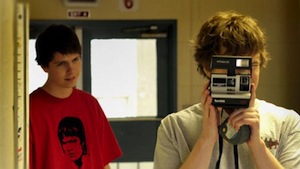 It's constantly referencing back to itself and to cinematic storytelling and geek culture too. When I first met you all, I said "This was me as a kid, as a teenager." As you've stated as well. What amazes me about the film is that it can exist in that celebratory place of adolescence and reveling in these things that you love separate to the very complex critique of violence, bullying and psychopathic behavior... despite remaining intrinsically all tied together.
It's constantly referencing back to itself and to cinematic storytelling and geek culture too. When I first met you all, I said "This was me as a kid, as a teenager." As you've stated as well. What amazes me about the film is that it can exist in that celebratory place of adolescence and reveling in these things that you love separate to the very complex critique of violence, bullying and psychopathic behavior... despite remaining intrinsically all tied together.
I think the separation of them is one of the more troubling things in the film. This sort of sympathy building engine of young guys just being themselves, and everybody kind of being able to relate to them... then transforming into this thing that I think everyone thinks is so separate from that. I think that forced connection between the two...
The connection doesn't seem forced though.
Right, right.
In the film, and I think how we look at ourselves, and perceive ourselves in media. You were talking about how Matt starts referencing himself as a film character rather than a real person. I think that's how he rationalizes the act that he is going to commit. This is for the good of the movie. That's how he's been coping with all of this.
And the ends justify the means. Because movies are so amazing to him, that of course if you make a great movie... nobody will be critical of you if the movie is great. I think that's very much the way that character thinks, and certainly the way I think in real life to an extent. I remember there were all these things I wanted to shoot for the movie that nobody would let me shoot. I wanted to shoot this sequence where I was running into a train, and the train would be barreling into me. Just to show audiences how crazy I was. I wanted to jump off the tracks at the last conceivable second. Everyone else said I was going to kill myself... that I was actually going to die. I was like "come on, I'll be able to do it!" Matthew Miller called all the people I had gone to film school with and told them all not to film this scene with me. I was trying to get this scene shot 'cause the train tracks were right behind [composer] Jay [McCarrol]'s house. I could shoot it whenever I wanted and nobody would shoot it with me 'cause Miller had told everybody that they were not allowed 'cause I was gonna die.
How do you feel about that idea in retrospect?
I think that people are always so concerned about safety and something going wrong. I think the more you can show audiences super dangerous, unfakeable, death defying things, the more exciting your movies can be. So I have absolutely no issues with that. I would shoot that train scene today.
That's rather amazing to hear. I would think, as a filmmaker, the way you would rationalize it now is that those moments are too big and over the top for him, even as a character who takes everything to such extremes.
No, I think had we done that in the first half, the movie would be much better.
There's something really important about that opening scene where Matt is connecting with those kids making their own movie... essentially younger versions of he and Owen.
I had a dream about those kids last night. They were at the Q&A... the Q&A they're gonna be at for the film in a couple of days actually. Did you hear that the movie they were making, The Visitor, is finished?
No, I didn't. That's great.
They finished it and we're gonna release it on [The Dirties] DVD.
Is it a short or a feature? I
think it's 22 minutes.
I wanted to ask what the next film is going to be. Could you tell us a little bit about that?
Yeah. It's actually pretty simple to understand. It's like The Dirties except set in the 1960s about the CIA, and the CIA's involvement with NASA. So it's a fake documentary that's going to be presented as an unarchived CIA film about this team of three young guys who wind up faking the moon landing.
So are you guys preparing to shoot?
We've shot some stuff already, back in April. And I think we'll start shooting everyday once Owen is done teaching, which will be June. It will be way better than The Dirties!
Well...
Oh just wait. Oh just wait...
It sounds like it will be quite a different movie from the subject matter.
It seems like it would be different. But I play myself, Owen plays himself and we're making a movie about ourselves.
Indie Beat is an alternative look at the wide-ranging world of independent cinema.

Do you feel this content is inappropriate or infringes upon your rights? Click here to report it, or see our DMCA policy.






